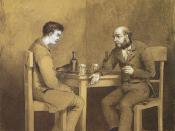The novel Crime and Punishment by Fyodor Dostoevsky demonstrates how man pays by suffering for his crimes against men. Dostoevsky portrays this belief through the character of Raskolnikov, who we observe throughout the novel mentally torment himself, after murdering an old pawnbroker (Alyona Ivanovna) and her stepsister (Lizaveta). Raskolnikov ultimately committed the murders because of his theory of the "superman", or belief that men are divided into two categories: ordinary and extraordinary; and those men considered to be extraordinary have the right to commit any crime. Since he conceived of him-self as being extraordinary, he believed it was his right to be exempt from moral law. However after committing the murders, Raskolnikov begins to doubt himself and questions his theory: but not so much its basis. He comes up with a couple of factors to compensate for its failure, ultimately determining him-self as the overlying factor. Raskolnikov's dual personality is most attributed to this, as he is torn between the ideas of complete stubbornness and power and extreme compassion and self-obedience.
This split in personalities is revealed in the characters of Sonia and Svidrigailov. Sonia represents Raskolnikov's compassionate side, while Svidrigailov represents Raskolnikov's evil side. In the end it is Raskolnikov's suffering that is to lead him to redemption, and it is Sonia who helps him attain this redemption.
Raskolnikov's theory of the "superman" is a very interesting philosophy of crime, particularly pertaining to the ordinary man versus the extraordinary man. In his theory, Raskolnikov summarizes that men are divided into two categories: "ordinary" and "extraordinary." He argues that ordinary men have to live in obedience to the law because they are ordinary, but extraordinary men, on the contrary, have the right to commit any crime and break any law because they are extraordinary (259). Raskolnikov adds that...


